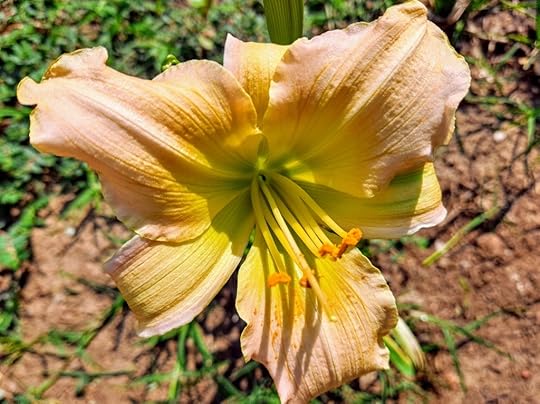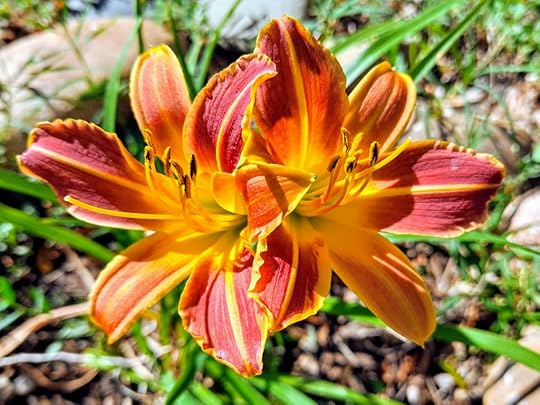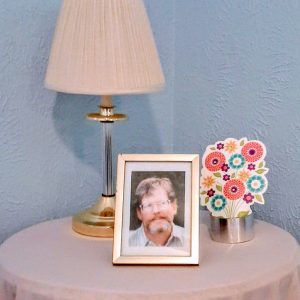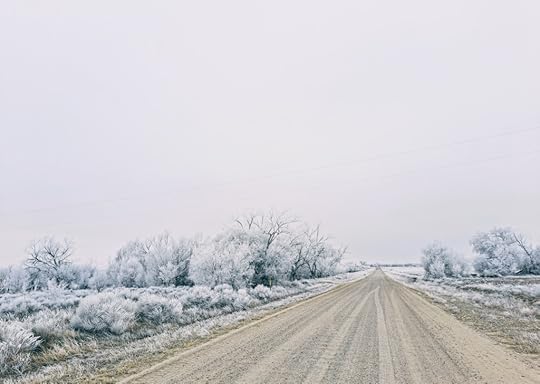Pat Bertram's Blog, page 51
August 17, 2021
Standing Still
For lack of a better topic, today I’m going to write about . . . me. That, of course, is a joke because all I ever write about is me, in one way or another. Writers are often told to write what we know, and pretty much all I know is me, at least to the extent that any of us know ourselves.
Oddly, I seem to be standing still, always in the same place, waiting for workers to come on Friday, waiting for my brakes to be fixed on Monday. I’m not sure what the problem is with the workers not showing up — probably the contractor, as always, is way behind, and so has no one to send over here. Getting the brakes fixed is a different story every week — either the part didn’t come in or the wrong part was sent or the mechanic is dealing with lingering “Bob” issues from his very bad bout with the virus or . . . something.
And so, once again, I am standing in that same place, where the workers are supposed to come on Friday and I’m supposed to take my car to the mechanic on Monday.
On the brighter side, one of my new day lilies has bloomed!

And one of my original daylilies has bloomed again.

Surprisingly, my cherry tomato plants are fruiting. I didn’t really expect to get any tomatoes; I just planted them because I could. There aren’t a whole lot, just a small handful every other day, which actually is perfect for me. Never having planted tomatoes of any kind before, I am amazed at how big the plants get! I might need to invest in tomato cages next year to keep them contained because stakes and string don’t really do the job.
Despite these small successes, I seem to be standing still in regards to my gardening, too, always planning for next year — what to try, what to do differently, how to battle the ever-encroaching weeds.
I suppose standing still isn’t so bad. At least I’m not running in place, wearing myself out, and getting nowhere.
***

What if God decided S/He didn’t like how the world turned out, and turned it over to a development company from the planet Xerxes for re-creation? Would you survive? Could you survive?
A fun book for not-so-fun times.
Click here to buy Bob, The Right Hand of God
August 16, 2021
The Quiet After the Questioning
As I talked to Jeff when I was getting ready for bed the other night, it suddenly dawned on me that I no longer asked myself — or him — the hard questions, or any questions at all, for that matter. It could be a good thing, perhaps a sign that I have reached an accommodation with life and death. It might be a not-so-good thing, possibly resignation or stagnation or exhaustion from trying to make sense of it all. Or it could be something else, neither good nor bad, maybe just letting my mind filter out the unanswerable questions. Most probably, it’s simply an acceptance that so much of what we want to know is unknowable.
But oh, at the beginning of my grief, there were way too many questions. Those questions kept my brain so busy trying to come up with solutions, that I often felt muddled and unreal.
Even years after his death, I was haunted by the hard questions. You know the ones: Who are we? Why are here? Is this all there is? Where did our loved ones go? Will we see them again? What is the meaning of life? And probably the most haunting of all, what is the meaning of death?
It wasn’t only grief that brought out these questions. When I was young, I’d often pondered such questions during my quest for truth and a greater reality, and I’d come to believe that God is the spirit of creativity that fuels the universe, and we are each a part of that creativity. For most of my adult life, I was content believing that our spirit/energy returned to the whole . . . until Jeff died. Then all of a sudden, I didn’t want that to be the truth. I wanted him to continue existing as him, as the man he was, not as part of an amorphous energy source.
And so the questions pounded at me. Not just the hard questions I mentioned, but others, too, such as: was it fate that we met, fate that he died? If he’s in a better place, why aren’t I there? If life is a gift, why was it taken from him? Is he proud of the woman I’ve become? Would he still like me if we were to meet?
It seems as if all I had were questions, but now? The questions, although they remain unanswered, don’t haunt me, at least not at the moment. The main effect of this silence is . . . well, silence. And the main effect of that mental silence is a struggle for blog topics.
For a while, I was invested in trying to come up with answers as to what this “Bob” situation is all about, but eventually I realized that with most of the questions I’ve asked over the years, there is no real answer, just a lot of speculation, and eventually, speculation loses its luster.
I must admit, I do enjoy not having my brain roiling with unanswerable questions.
Luckily, I still manage to find something to blog about. Luckily for me, that is, though perhaps not for you.

***

Pat Bertram is the author of Grief: The Inside Story – A Guide to Surviving the Loss of a Loved One. “Grief: The Inside Story is perfect and that is not hyperbole! It is exactly what folk who are grieving need to read.” –Leesa Healy, RN, GDAS GDAT, Emotional/Mental Health Therapist & Educator
August 15, 2021
The Powers That Be
In almost every book I read lately, the author mentions, at least once, “the powers that be.” The expression irritates me because . . . well, because it’s irritating. It’s a cliché, and like so many clichés, it’s too general. If “the powers that be” refer to the people who decide what is allowed or acceptable in a group or organization or government, then in any given situation, the powers that be are different. For example, if the author is referring to the board in charge of a homeowner’s association, then those powers that be are completely different from those governing a country.
So to use the phrase “the powers that be” is not just a cliché, but it’s also pure laziness on the author’s part. If “the powers that be” in a book are important enough to be mentioned in such a haphazard way, then they are important enough to be mentioned more specifically, by occupation if nothing else.
Sometimes the author puts those words in a character’s mouth, which is even worse because truly, no one ever uses that phrase in everyday conversation. They say, “the cops” or “the governor” or the “president’ or they mention the person by name or title.
I took time out of from this diatribe to see where the phrase came from, and it’s an old one. Many centuries-old phrases come from Shakespeare or the bible, and this one is no different. Do you care to hazard a guess before I tell you?
If you guessed the bible, you’re right. The first time the phrase showed up in print was in William Tyndale’s 1526 translation of the New Testament: “Let every soul submit himself unto the authority of the higher powers. There is no power but of God. The powers that be, are ordained of God.”
The King James version is: “Let every soul be subject unto the higher powers. For there is no power but of God: The powers that be are ordained of God.” (Romans 13:1)
It seems to me the common literary usage has come to mean something, if not completely different, then a sideways skew, because in no usage I’ve ever read do “the powers that be” have anything to do with getting their authority from God. Generally, they are given their power by other (secular) powers that be or they take upon themselves whatever power they have.
Another phrase I frequently come across in books are “the authorities,” which basically means the same thing — that the author is too lazy to figure out who those authorities are. I have to confess, I think I might have used “the authorities” once for that very reason: I didn’t know who my particular authorities would be, so I copped out.
Now that I got that off my chest, I can go back to reading the book, though I imagine I will still grit my teeth whenever I come across either “the authorities” or “the powers that be” just as I grit my teeth and bear it whenever I come across authorities or powers that be in real life.
[image error]Pexels.com" data-medium-file="https://ptbertram.files.wordpress.com..." data-large-file="https://ptbertram.files.wordpress.com..." src="https://ptbertram.files.wordpress.com..." alt="" class="wp-image-20502" width="600" />***

What if God decided S/He didn’t like how the world turned out, and turned it over to a development company from the planet Xerxes for re-creation? Would you survive? Could you survive?
A fun book for not-so-fun times.
Click here to buy Bob, The Right Hand of God
August 14, 2021
Nothing is Something
In a book I just finished reading, a kid insisted that nothing was something. The comment was irrelevant to the story; it was just one of those things authors throw in there because they can. My mind did not skim over the idea as it normally would have, nor did it start philosophizing about somethings and nothings. Instead, my mind immediately shifted to thoughts of the “nothing” that is left behind after someone intrinsic to our life dies. That void inside us — that nothing — is definitely a something. We feel it in the very depths of our being long after the loved one leaves us.
The definition of “nothing” is “the absence of a something or particular thing that one might expect or desire to be present.” And boy, do we desire the presence of our loved one. We also expect them to be present. For years, every time I answered the phone, I expected it to be him telling me I could come home. I knew it was impossible, and of course, that expectation came to naught.
That expectation as well as the great yearning that so consumed me during the first years of grief are finally gone, replaced by . . . I’m not sure what, exactly. It’s not really nostalgia, more like a restructuring of his absence. Instead of yearning for him, I talk casually to him. Or rather, I talk to his picture. The photo — the same one I could not look at for years after he died because it brought me great pain — sits on the bedside table on the opposite side of where I sleep. I’ve gotten into the habit recently of telling him I miss him, talking about my day, and asking him about what’s going on with him. This is a very short conversation, mostly just a few sentences on my part as I get ready for bed, and none on his part. Though to be honest, if that photo ever answered me, I’d be scared out of whatever wits I have.
Despite this new, rather pleasant permutation of my grief, I can still feel the void he left behind as a physical thing. I shouldn’t be able to feel that — right? — because after all, a void by definition is an empty space. And yet, there it is, an emptiness, a nothingness that seems to color my life, just as his somethingness once colored it.
And, after more than eleven years of his being gone, it’s beginning to look as if that nothing/something inside me will be a permanent fixture for the rest of my life.

***

Pat Bertram is the author of Grief: The Inside Story – A Guide to Surviving the Loss of a Loved One. “Grief: The Inside Story is perfect and that is not hyperbole! It is exactly what folk who are grieving need to read.” –Leesa Healy, RN, GDAS GDAT, Emotional/Mental Health Therapist & Educator
August 13, 2021
Rain on the Plain

It must be very difficult for the weather folk to determine a forecast for this area. Way too often they send frantic alerts for storms that never show up. Other times, like yesterday, they say there is zero chance of rain. Even later in the afternoon, when a few clouds blew in, they still insisted we had only a minuscule chance of rain.
And then, suddenly, from one second to the next, it seemed, the mostly clear skies gave way to gray clouds, and rain poured down.
Although the people I work for often offer me a ride back to my house, until yesterday, I have always refused. I live a mere two blocks away, and neither rain nor snow, nor heat, nor gloom of night ever kept me from walking home. I know they worry about me, but I don’t. As I always said, when they offered a ride, was, “It’s only two blocks.”
Last evening, for the first time, I was grateful for the offer of a ride. Even though I’d only be outside for the few minutes it would take to walk home, it seemed an almost insurmountable task. I mean, it was RAINING! I’ve often heard a cliché about rain and turning on a faucet, and it truly did seem as if someone up above opened a faucet a mile wide and was dumping water on us. (That’s how clichés become clichés — because they are true often enough that they become overused.) Yikes.
Poor visibility, flooded streets, chilly temperatures are the very reasons I I hesitate to accept rides. I figure if it’s hard walking, then it’s also hard driving. But yesterday, with a ride, at least I didn’t get quite as drenched as I would have otherwise.
Of course, if I had known about the rain, I would have come prepared with a waterproof hat, an umbrella, and appropriate clothes. I must admit, I was more concerned about my hat — a gift from a friend — than I was about me. I was afraid the rain would ruin the hat. As it turns out, the hat still got damp enough to be bent out of shape.
But I got home safely and not too wet.
And I have a better respect for the volatility of the weather out here on the plains.
***

What if God decided S/He didn’t like how the world turned out, and turned it over to a development company from the planet Xerxes for re-creation? Would you survive? Could you survive?
A fun book for not-so-fun times.
Click here to buy Bob, The Right Hand of God
August 12, 2021
Widow’s Brain
A friend whose husband recently died mentioned, quite frantically, that she isn’t able to think or keep any thoughts in her head anymore. Although she worried that such a state was abnormal, which it normally would be, it is perfectly normal for a new widow or widower. During that first year of grief and sometimes beyond, almost all of us have to deal with some sort of mental fogginess. This state is more commonly known as “widow’s brain,” and though I used the term in the title of this blog, I generally refrain from the term because men also suffer from this condition.
As bad as the shock and pain and fogginess are that first year, they do seem to offer some sort of protection. Although we know the deceased loved one is gone, we don’t KNOW it, don’t really want to know it. We feel their goneness, of course, in the very depths of our being, but one part of us holds out hope that, as impossible as it may be, the whole thing is a test. When we get through that first year, all will be well. Then, of course, dawns the 366thday, and we are faced with the unpalatable and undeniable truth that their being dead is no test, no mirage created out of a foggy brain, but the reality of our situation. Because of this raw realization, sometimes the second year is worse than the first. It was for me, and it was for many widows and widowers I know.
Although the friend didn’t ask for my advice, I still suggested that she be patient with herself and not make any important decisions without thinking and thinking again. Very few people understand the reality of this brain fog —the grief-induced amnesia, dazedness, and fogginess that shroud us after the death of a life mate — but it is a real condition. And we need to protect ourselves from ourselves as best as we can.
As I wrote in Grief: The Inside Story — A Guide to Surviving the Loss of a Loved One:
The whole brain is involved in the grief process, but the prefrontal cortex is the part of the brain that seems to contribute the most to brain fog. The prefrontal cortex is considered the executive branch of the brain and is associated with rational thinking and making sense of emotions, developing and pursuing goals as well as coordinating the brain’s activities. Because we grievers are on total emotional overload, our prefrontal cortex is unable to process all the information it is being fed from all parts of the brain. The more we try to suppress our emotions and try to think our way out of grief, the more overloaded the brain becomes.
Although short-term memory loss, inability to concentrate, missing memories and memory gaps are common, they all add to the general chaos and stress of grief, and make us feel as if we are crazy. Or worse. Denise, a Facebook friend, said she felt like she had a traumatic brain injury after the sudden death of her husband. But we are not crazy. We did suffer a traumatic brain injury of sorts when we lost the person fundamental to our lives, and now we are overwhelmed by the shock and horror and stress of that loss.
Although this fog numbs us to protect our hearts and bodies from the worst effects of losing our life mates, it can be a financially damaging condition.
Three finance professors from major business schools investigated Danish CEOs who lost someone significant in their lives, and they found that family deaths were strongly correlated with declines in firm operating profitability.
So yes, the newly bereaved need to be cognizant of brain fog, widow’s brain, whatever one calls the state, be patient with themselves, and be aware of the possibility of making disastrous decisions.
[image error]Pexels.com" data-medium-file="https://ptbertram.files.wordpress.com..." data-large-file="https://ptbertram.files.wordpress.com..." src="https://ptbertram.files.wordpress.com..." alt="" class="wp-image-19657" width="600" srcset="https://ptbertram.files.wordpress.com... 1024w, https://ptbertram.files.wordpress.com... 150w, https://ptbertram.files.wordpress.com... 300w, https://ptbertram.files.wordpress.com... 768w, https://ptbertram.files.wordpress.com... 1729w" sizes="(max-width: 1024px) 100vw, 1024px" />***

Pat Bertram is the author of Grief: The Inside Story – A Guide to Surviving the Loss of a Loved One. “Grief: The Inside Story is perfect and that is not hyperbole! It is exactly what folk who are grieving need to read.” –Leesa Healy, RN, GDAS GDAT, Emotional/Mental Health Therapist & Educator
August 11, 2021
Impact of Owing A House
On my way home from the library yesterday, I passed the hardware store and exchanged a few words with the workers who were outside taking a break. When I continued on, it dawned on me that owning a house has had some odd impacts on my life, including this one. I had never before been on a first name basis with any hardware store employee. Nor has any hardware store employee ever known where I lived. One of the workers lives around the corner from me, but that’s just a coincidence. Mostly they know me because of deliveries they have made to my house.
I’m also on a first name basis with contractors and other laborers.
Those aren’t the only impacts on my life because of home ownership, they are just the ones that got me to thinking. Some of the changes to my life since moving here would be the same whether I owned or rented, such as a library within a few blocks, easy access to a grocery store, and nice neighbors. I tend to think the neighbors are a bit nicer to me because I own the house; after all, if I own, I am one of them and will be around for a long time if everything goes as planned. Also, I’ll take care of my property unlike most of the renters around here.
The most basic impact is a feeling of being at home. As long as Jeff and I were together, I always felt at home because as long as we were together, that was my home. After he died, I tried to find a sense of home in myself, and mostly succeeded. Oddly, until now, the feeling of being at home was strongest when I was camping in a national park because to a certain extent, the parks belong to me (to all of us), and when I paid my camping fee, that small plot of land was specifically mine for the nights I stayed there.
Almost as important as a feeling of being at home is peace of mind. For almost the entire decade after Jeff died, I was unsettled and uncertain. I often brooded about what I wanted, where I wanted to move, where I could afford to live, how to start over. That last point was a major one, because truly, how does one start their life from scratch? Well, I’ve done it — started my new life — so I don’t have to think about that anymore. Nor do I have to think about where to go because I’m here. And, since I’m working, I don’t have to worry how to pay for this new life.
Also, for the first time in a decade, I don’t think about what I have to get rid of. I got rid of a huge amount of stuff after Jeff died, and then again before I moved my things into storage after my father died, and yet again before I moved here. Even though the current philosophy seems to be that if you haven’t used something in a year, you should get rid of it, I don’t subscribe to that idea any more. I’ve gotten rid of so many things over the years I needed to repurchase, that as long as I have space, I might as well keep what I have. Obviously, as time goes on and I reach my expiration date, I’ll have to get rid of almost everything so no one will have the huge chore of sorting through my stuff when I’m gone, but until them, everything I own has a place. After the huge increase in possessions when I bought this house and furnished it as well as adding a garage, I’ve made no major additions to my possessions. Well, there are all the outside things I’m doing — the landscaping and plants and such — but those aren’t really possessions, they are simply additions to the property that will remain in place.
Having a permanent address is another benefit of owning my house since I won’t have to change the address until . . . well, until I have to because of age or whatever.
I’m sure there many other ways that home ownership has affected my life but they don’t come to mind at the moment. What does come to mind, however, is the thought — still so surprising to me — of how much I love owning my own home. I can feel it wrap around me like a well-worn and comfortable garment. Any place I’ve lived in the past was simply a place to park myself, but owning a house makes me feel as if I have a partner in life, as if the house and I are in this together. I take care of it, and so far, it has taken care of me.
And yes, I am exceedingly grateful for this blessing.

***

Pat Bertram is the author of Grief: The Inside Story – A Guide to Surviving the Loss of a Loved One. “Grief: The Inside Story is perfect and that is not hyperbole! It is exactly what folk who are grieving need to read.” –Leesa Healy, RN, GDAS GDAT, Emotional/Mental Health Therapist & Educator
August 10, 2021
Grief and Medication
I generally stay away from talking about medication when it comes to grief because it is a sensitive — and personal — topic. I have a firm belief that grief is not a medical condition that needs to or can be treated by drugs, and though this belief extends only to myself and not to others, I worry that my talking about the subject will make people think I am being judgmental of those who need medical help, and I am not. We all deal with grief the best we can, however we can.
Still, medication is a topic that needs to be addressed because many people don’t realize there is an alternative. Not an alternative to the pain, of course, because that comes with the territory of grief, but an alternative to drugs.
Learning the truth about grief — that we are not crazy; that no matter what we are feeling, it’s natural; that others have felt what we have felt; that grief, no matter how painful, is a process that will help us become a person who can survive the loss — goes a long way to weaning ourselves from a dependency on drugs.
Alice, an older woman I met in an online grief forum, took anti-depressants after the death of her husband because she thought her emotions, the physical reactions, the endless tears were abnormal, and no one told her otherwise. What she really wanted and needed was the reassurance that her grief was a normal reaction to an abnormal situation. We expect to be able to slide comfortably into old age with that one person we love more than anything, and when that person dies, excruciating pain and angst are normal reactions.
There’s no way we can learn about the normality of such grief except from people like me who are willing to talk about their experiences because the medical establishment has decided that anything but a mild grief is an abnormal condition, and the things we see in movies (and don’t see) seem to agree with that opinion. How many movies have you seen where a woman (always a woman!) is told about the death of her husband, and when she starts crying and screaming, a doctor is there to jam a hypodermic into her arm? A lot. On the other hand, the complex and painful experience of grief for a spouse is not something we see on television shows, in movies, or read about in novels. Fictional folks (when they are not being drugged into oblivion) shed a fictional tear or two, perhaps go on a fictional spree of vengeance, then continue with their fictional lives unchanged.
It seems as if this current reliance on drugs to “treat” grief is more about hiding than helping. In today’s world, grief needs to be hidden almost from the beginning so that it doesn’t offend other people’s sensibilities, so that it doesn’t bring the specter of negativity into other people’s lives. Drugs also hide your grief from yourself so you don’t have to face the raw reality of death. Drugs are good for that. They can hide your grief to a certain extent, but that’s all they can do. They cannot bring the deceased loved one back.
Some people do need medical help, of course, and they should get it. As Leesa Healy (RN, Emotional/Mental Health Therapist & Educator) wrote: “There are absolutely times when a therapist is required to nudge a person from being stuck, but the fact of the matter is that psychiatry since 2000 has become completely dependent upon what I call the drug/work model . . . i.e. create a diagnosis . . . create a drug . . . back to work for you. At least this is true in Australia and yes I’m qualified to say so (in case anyone wonders). Western psychiatry is leading us down a road of becoming the living dead and the risk is many folk are walking this journey willingly, unaware of the consequences so focused are they on the short-term fix. And who can blame them. It is not only our habit to avoid pain, but also, the very structure of any capitalist society is allowing us less and less time to be ‘truly human’.”
There were times I wanted the pain of being “truly human” gone since my grief was almost more than I could handle, but I wanted even more to feel sorrow that Jeff was dead. Well, actually what I wanted was him here, alive and healthy, but since I couldn’t have what I really wanted, I owed him my sorrow. I owed “us” my sorrow. He deserved to have someone grieve for him, to have someone feel the imbalance of the world without him in it. For me to have gone seamlessly from a shared life to a solitary life without a backward glance or a tinge of pain would have dishonored him. To not feel at all would have been way more of a medical problem than feeling too much.
Although medicine and psychology are the branches of science that have taken charge of grief and how it is described and understood, an anthropological approach — listening and observing — better captures the truth of the situation. Anthropology is the science that deals with the origins, biological characteristics, and social customs and beliefs of humankind, all of which pertain to grief. Few people listen to us bereaved; instead, they try to tell us how we feel. That is why support groups work. If the medical and scientific establishment won’t listen to us, we need to listen to each other, to observe how others are dealing with their grief, to talk about our own situation.
That’s the approach I took — listening, talking, writing, explaining what I learned about grief. I also walked. I was too restless to do much else (except cry) and as it turns out, walking is a good way to deal with grief, not just because of the sedative nature of walking but because it quiets the brain and lets the brain do the work of grief. When we’ve lost a person intrinsic to our lives, our brain goes into overdrive. So much of daily life is habit, and when that habit is suddenly disrupted, the brain tries desperately to identify new patterns and to find alternatives. Adding to the overdrive (and to the brain fog that is normal the first year of grief) is our need, however futile, to try to think our way out of grief. Walking helps put the brain back in its default mode — stream of consciousness. By simply feeling and not trying to make sense of grief, by letting thoughts drift through without trying to catch hold of any one of them, we can rest our brain and perhaps even open ourselves to new insights.
Not everyone is able to deal with grief in its raw state; in fact, many people are so traumatized they need extra help. As always, my mission, to the extent I have a mission, is to help people understand the nature of grief so they can deal with that cold, lonely road as best as they can — with or without medication.

***

Pat Bertram is the author of Grief: The Inside Story – A Guide to Surviving the Loss of a Loved One. “Grief: The Inside Story is perfect and that is not hyperbole! It is exactly what folk who are grieving need to read.” –Leesa Healy, RN, GDAS GDAT, Emotional/Mental Health Therapist & Educator
August 9, 2021
To Shirk or Not to Shirk

I was on my way out the door to take my car in to get the brakes fixed when I got a call from the mechanic cancelling the appointment. Even though he’d ordered the part in plenty of time, it turns out the company he ordered it from, which generally has next day service, had to special order it. So it won’t get here for a few more days. That’s the joy of owning a classic car! Luckily, I can still drive. The brakes work fine, but the warning light keeps coming on, so I never drive anywhere I would need to slam on the brakes in an emergency. Mostly I do what I’ve done for the past year and a half — drive the car slowly through town then head out on the four-lane highway until the end of the divided highway, then I come back and do whatever errands I need to do.
Because I can still drive, it’s not that big of a deal that he cancelled, but it did leave me feeling a bit lost as often happens when plans go awry. So I decided to clean house. There’s been a musty smell in here lately, though I’m not sure where it comes from — perhaps the dust I drag in from outside on my apparel, or maybe because I have to sleep with the windows closed due to the continual bad air quality alerts, or possibly because of the stale smoke blowing in from the fires on the west coast. I’ve let the dust build up more than I like lately since I’ve been spending so much time on my garden, and I thought this was the perfect time to get everything cleaned up.
Now the house smells like Murphy’s Oil and furniture polish. (I add the furniture oil to the diluted Murphy’s oil in the hope that it will help hydrate my 93-year-old unfinished wood floors, and so far it seems to work.)
Then I had to go check on the house I’m looking after for absent friends and take photos of some work that’s being done. And on the way back I picked up a few groceries.
I still have a few more things to do today (payback for yesterday, where I did nothing but lounge around and read), including going to work. My next planless day won’t come until the weekend, but that’s okay. It will be even more enjoyable since all my chores should be done and I won’t have any reason to feel guilty for being indolent. To be honest, I don’t feel guilty even if I do have reason to feel guilty — after all, there’s no fun in shirking one’s duties if there are no duties to shirk.
On the other hand, as I discovered today after all my work, there is fun — or at least a feeling of smugness — in not having shirked the day’s duties.
***

What if God decided S/He didn’t like how the world turned out, and turned it over to a development company from the planet Xerxes for re-creation? Would you survive? Could you survive?
A fun book for not-so-fun times.
Click here to buy Bob, The Right Hand of God
August 8, 2021
Surviving Air Quality Alerts
Denver had clean air long after smog choked other major cities, probably because in my youth, it was more of a cow town than a city. I remember being able to see the mountains from almost anywhere in town, but as the town grew into a city, fueled by the huge influx of people escaping the big cities in California and elsewhere, smog grew, too.
Ever since I left Denver, I’ve chosen to live in smaller places where the air is relatively clear. Where I live now is so far from any major city that I should never have to worry about air quality alerts, and yet lately the alerts come rather frequently. It has nothing to do with us; the problem is the smoke from wildfires in California being blown into Colorado and beyond.
Because of my smoke allergy, this has been a particularly rough time for me, with bad sinus headaches, lack of energy, and a bit of chest congestion. Admittedly, these problems are nothing compared to what people directly affected by the fires have to deal with, but I still have do what I can to protect myself. Today, after I watered my bushes and garden areas, I spent the day inside with the windows closed. Such precautions don’t really help much because the air seeps inside, and even after the air quality alert is cancelled, it takes days for my allergy symptoms to clear out.
Despite that, it was still a pleasant day. I lounged around most of the afternoon, reading and drinking tea.
Once this brief blog update is posted, my plans for this evening, to the extent that I have any plans, will be pretty much the same. Luckily, I have a fresh stack of books from the library as well as a large stash of tea.

***

Pat Bertram is the author of Grief: The Inside Story – A Guide to Surviving the Loss of a Loved One. “Grief: The Inside Story is perfect and that is not hyperbole! It is exactly what folk who are grieving need to read.” –Leesa Healy, RN, GDAS GDAT, Emotional/Mental Health Therapist & Educator



